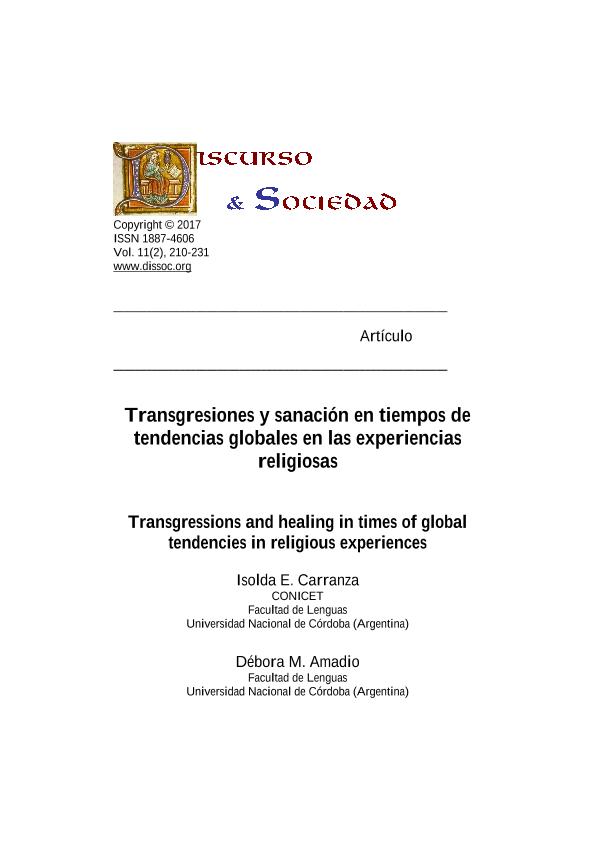Mostrar el registro sencillo del ítem
dc.contributor.author
Carranza, Isolda Esmeralda

dc.contributor.author
Amadio, Débora Mónica

dc.date.available
2018-12-06T13:14:24Z
dc.date.issued
2017-06
dc.identifier.citation
Carranza, Isolda Esmeralda; Amadio, Débora Mónica; Transgresiones y sanación en tiempos de tendencias globales en las experiencias religiosas; Universitat Pompeu Fabra; Discurso & Sociedad; 11; 2; 6-2017; 210-231
dc.identifier.issn
1887-4606
dc.identifier.uri
http://hdl.handle.net/11336/65953
dc.description.abstract
Los fenómenos relacionados a la globalización tales como los flujos de ideas religiosas de oriente a occidente (Mooney 2013) tienden a ser abordados sin atender a lo local y al análisis detallado del discurso efectivamente producido por actores sociales comunes en el curso de sus actividades cotidianas. Esa es precisamente la mirada que puede aportar el presente trabajo sobre discurso situado producido en la interacción cara a cara en el desarrollo de un acontecimiento institucional, la misa católica. Los estudios afines se han centrado en las prescripciones con las que la jerarquía eclesiástica orienta la escritura del texto que posteriormente deberá ser oralizado como homilía (Arnoux 2015). En cambio, aquí el foco está puesto en un género oral que la comunidad llama “examen de conciencia”. En el análisis, detectamos las voces discursivas, rastreamos el modo en que son concebidas las transgresiones y recurrimos a los trabajos que señalan cómo los vínculos entre religiosidad y terapias alternativas van ganando terreno en el medio local (Papalini 2017). Los resultados contribuyen a comprender el rol mediador del sujeto en el proceso de sanación y la dimensión pedagógica del género discursivo en cuestión.
dc.description.abstract
Globalization related phenomena such as the flows of the religious ideas from the East to the West (Mooney 2013) tend to be approached without attending to the local and to the detailed analysis of discourse actually produced by ordinary social actors in the course of their everyday activities. That is precisely the view that this paper can shed over situated discourse produced in face to face interaction during the development of an institutional event, the Catholic mass. The previous studies have concentrated on the prescriptions with which the church hierarchy orients the writing of the text that must later be spoken as a homily (Arnoux 2015). In contrast, here the focus is on an oral genre which the community calls ‘self-examination’. In the analysis, we detect the discursive voices, trace how misconduct is conceived and turn to the works that point to the links between religiosity and alternative therapies and how they have become common in the local milieu (Papalini 2017). The results contribute to understand the subject’s mediating role in the process of healing and the pedagogical dimension of the studied genre.
dc.format
application/pdf
dc.language.iso
spa
dc.publisher
Universitat Pompeu Fabra
dc.rights
info:eu-repo/semantics/openAccess
dc.rights.uri
https://creativecommons.org/licenses/by-nc-sa/2.5/ar/
dc.subject
Heteroglosia
dc.subject
Mediacion
dc.subject
Castigo
dc.subject
Perdon
dc.subject
Discurso Institucional Tradicional
dc.subject.classification
Estudios Generales del Lenguaje

dc.subject.classification
Lengua y Literatura

dc.subject.classification
HUMANIDADES

dc.title
Transgresiones y sanación en tiempos de tendencias globales en las experiencias religiosas
dc.title
Transgressions and healing in times of global tendencies in religious experiences
dc.type
info:eu-repo/semantics/article
dc.type
info:ar-repo/semantics/artículo
dc.type
info:eu-repo/semantics/publishedVersion
dc.date.updated
2018-10-19T15:19:25Z
dc.journal.volume
11
dc.journal.number
2
dc.journal.pagination
210-231
dc.journal.pais
España

dc.journal.ciudad
Barcelona
dc.description.fil
Fil: Carranza, Isolda Esmeralda. Universidad Nacional de Córdoba. Facultad de Lenguas; Argentina. Consejo Nacional de Investigaciones Científicas y Técnicas. Centro Científico Tecnológico Conicet - Córdoba. Centro de Investigaciones y Estudios sobre Cultura y Sociedad. Universidad Nacional de Córdoba. Centro de Investigaciones y Estudios sobre Cultura y Sociedad; Argentina
dc.description.fil
Fil: Amadio, Débora Mónica. Universidad Nacional de Córdoba. Facultad de Lenguas; Argentina
dc.journal.title
Discurso & Sociedad
dc.relation.alternativeid
info:eu-repo/semantics/altIdentifier/url/http://dissoc.org/ediciones/v11n02/DS11(2)Carranza&Amadio.html
dc.relation.alternativeid
info:eu-repo/semantics/altIdentifier/url/https://dialnet.unirioja.es/servlet/articulo?codigo=6140606
Archivos asociados
